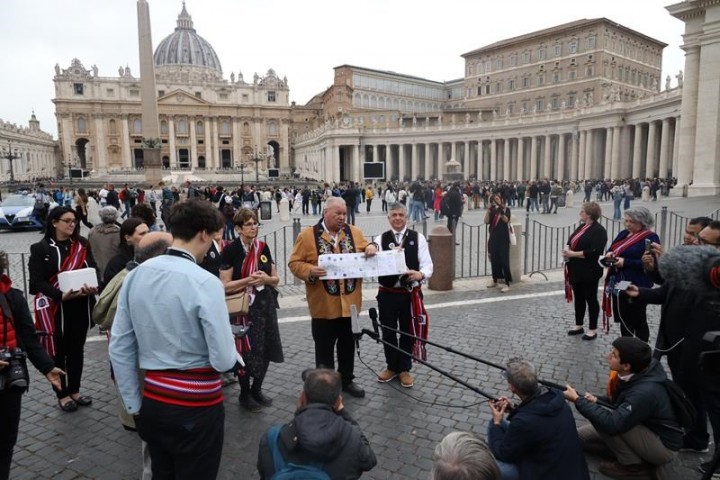ROME — A Métis group from Manitoba says Pope Francis took ownership of the harms done by the Roman Catholic Church during the first meeting with an Indigenous group at the Vatican since the pontiff’s historic apology.
“He understands the damage that was done and he asked that we in that room and the Red River Métis forgive him and the church,” Manitoba Métis Federation president David Chartrand said after the meeting Thursday.
“That’s a very powerful way to start the healing process.”
Andrew Carrier said he spoke about his experiences as an abuse survivor at a Catholic day school. The Pope was sincere and listened, Carrier said.
“We need to overcome this pain and move forward,” he said.
On April 1, after meetings with First Nations, Inuit and Métis groups, Francis apologized for the deplorable conduct of church members involved in residential schools. He stood before a room of nearly 200 Indigenous delegates and asked for God’s forgiveness for the actions of the Catholic Church.
“I want to say to you with all my heart: I am very sorry,” Francis said in Italian. “And I join my brothers, the Canadian bishops, in asking your pardon.”
An estimated 150,000 Indigenous children were forced to attend residential schools, more than 60 per cent of which were run by the Catholic Church.
The Manitoba Métis Federation organized the separate meeting with the Pope because the group last year withdrew from the Métis National Council following years of internal conflict.
The national council was part of the larger Indigenous delegation.
Chartrand said the Manitoba Métis understood there “were individuals that were predators, evil and did such harm to so many. It wasn’t the church.”
After the apology, there was pushback from some Indigenous people in Canada who said it focused on the actions of a few members of the church. They said the apology did not recognize the lasting damage that was done in residential schools.
Chartrand said Métis people experienced significant harm to their culture, language and identity through actions of the churches.
But, he said, the ties between Métis and the Roman Catholic Church remain deep and strong.
A Catholic priest played a significant role in Métis leader Louis Riel’s founding of what would become Manitoba. Rev. Noël-Joseph Ritchot led the delegation Riel sent to Ottawa to negotiate the provisional government’s entry into Confederation.
Riel himself was Catholic but also wrote about his issues with the church.
In 1817, the Métis petitioned to have churches built in Western Canada, Chartrand noted.
Francis told the group that it’s important to learn to walk in other people’s shoes, said Archbishop Richard Joseph Gagnon, who accompanied the latest delegation. That means learning to appreciate the importance of culture and the spirituality of others, he said.
“If all of us, if we can learn to appreciate other people’s journeys more, then the future does have a lot of hope,” Gagnon said.
The group gave the Pope a scroll that explained the Métis history with the church, beaded moccasins, a Louis Riel coin and beaded crosses. They received a brass olive branch in return.
Chartrand said he invited the pontiff to come to Manitoba to visit Riel’s grave at Saint-Boniface Cathedral cemetery in Winnipeg as part of an expected trip to Canada.
The Manitoba Métis delegation came with a message of hope and revitalization, Chartrand said.
“We can’t change history but we definitely can change the future.”
This report by The Canadian Press was first published April 21, 2022.
— By Kelly Geraldine Malone in Winnipeg
The Canadian Press
